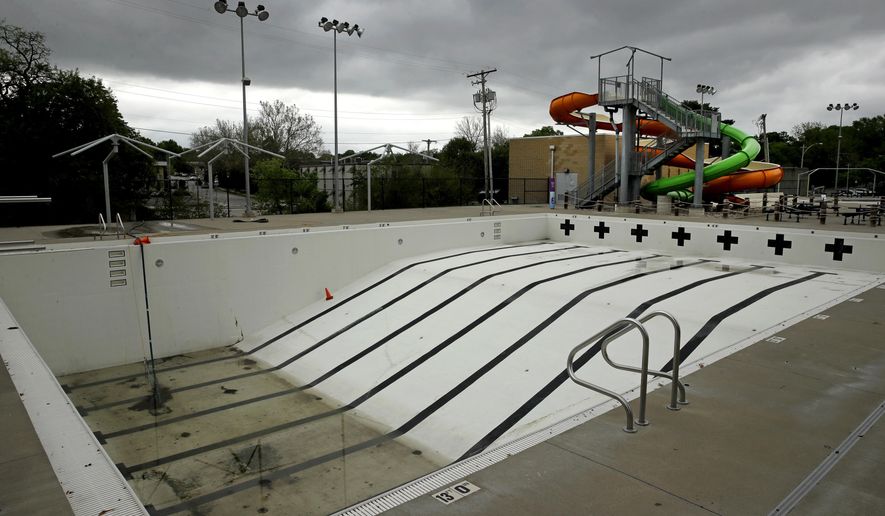
US communities face tough choices on opening public pools
by HEATHER HOLLINGSWORTHMISSION, Kan. (AP) - Public pools will look very different this summer if they open at all with the coronavirus threat still looming, as teenage lifeguards will be tasked with maintaining social distancing and spotting COVID-19 symptoms in addition to their primary responsibility of preventing drownings.
Pools that do plan to open will take precautions, including screening temperatures on entry, requiring lifeguards to wear masks and significantly reducing the number of swimmers allowed in the water and locker rooms, said Dr. Justin Sempsrott, the medical director for the lifeguard certification program Starguard Elite and executive director of Lifeguards Without Borders, which works to reduce drownings worldwide.
“It’s definitely not going to be business as usual this season,” he said.
Amid the uncertainty, sales of inflatable pools that cost less than $150 have increased by 165% over the seven-week period that began March 15, compared with the same period last year, according to NPD Group, a data and consulting firm. Meanwhile, most of the people who were planning to install in-ground pools in their yards before the COVID-19 shutdown caused economic havoc have decided to proceed, said Sabeena Hickman, the CEO of the Pool & Hot Tub Alliance, an industry trade group, which reached out to the country’s top 25 residential pool builders.
“It appears as if a lot of people are looking for pools and hot tubs for staycations,” she said. “We are anticipating that it will be a strong season for backyard pools.”
Walmart reported an uptick in the sales of pools and swimming gear such as foam noodles, and Bass Pro Shops said more people have been buying fishing gear and kayaks, though neither company provided specifics.
“If there is a bright spot in this horrible COVID-19 tragedy, it’s the unprecedented interest from fathers, mothers, grandparents, aunts and uncles all wanting to take their family out to enjoy nature,” said Johnny Morris, Bass Pro Shops’ founder and CEO.
Properly chlorinated pools can kill the virus, but youngsters splashing around together could be unwittingly spreading it without knowing they are infected, said Sempsrott, who is also an emergency room doctor in Boise, Idaho, who has treated COVID-19 patients.
Some pool operators have decided to delay opening or just offer lap swimming and lessons, while others have already called it quits. The National Recreation and Park Association, a nonprofit that advocates on behalf of public parks, recreation and conservation, said 31% of agencies with pools have decided not to open them this summer and 46% were awaiting additional guidance from government and health officials before making a decision. Of those that are opening, only 5% plan to operate fully; the other 18% will do so with truncated offerings.
Among those that have opted not to open their pools this summer is the Kansas City suburb of Mission. In normal times, its outdoor pool is packed with kids, including a roughly 300-strong swim team, afternoon day camps and neighborhood children just looking to cool off and have fun.
City spokeswoman Emily Randel said opening this summer would have been too difficult given the added responsibilities of enforcing social distancing that would largely have fallen to teenage lifeguards. Kansas officials also have made June 8 the earliest that public pools can open.
“Putting it on our youngest staff seems like quite a burden for them,” she said.
Sempsrott said lifeguards will be “essential health care providers” this summer and will need to be provided with protective gear and a plan for what to do if a swimmer who arrives in apparently good health suddenly starts coughing or displaying other COVID-19 symptoms.
“The aquatic industry has been built on safety and prevention,” Sempsrott said. “If we aren’t able to safely open and reduce risk to an acceptable level, it doesn’t make sense to open in the middle of a pandemic.”
There are also financial concerns that need to be weighed. Some places have said they can’t afford to open their pools because of the decline in tax revenue caused by the coronavirus and the efforts to slow it’s spread. New York City, for example, estimates it will save $12 million by keeping its pools closed.
The closures will also mean the loss of many summer swim teams. USA Swimming has already canceled some high-level summer meets.
Sempsrott, meanwhile, warned that there could be more child deaths, as beginner swimmers take their chances in backyard pools without a lifeguard watching and with parents who may be distracted as they juggle working from home.
The kids are going to slip away into the backyard pool because you are on a Zoom meeting,” said Sempsrott. “Before, they would have been in preschool.”
Similar concerns were raised by the American Canoe Association, which also promotes kayaking and rafting. Beth Spilman, the interim executive director of the group, said it is hearing that boating could be at an all-time high this summer and is considering a social media campaign to promote safety.
“We know that there are concerns in the paddling community that there will be an influx of beginner or armature paddlers who are perhaps getting on the water without adequate instruction and that will cause an issue for local safety and rescue and perhaps for the Coast Guard,” she said.
Check out more of the AP’s coronavirus coverage at https://apnews.com/VirusOutbreak and https://apnews.com/UnderstandingtheOutbreak